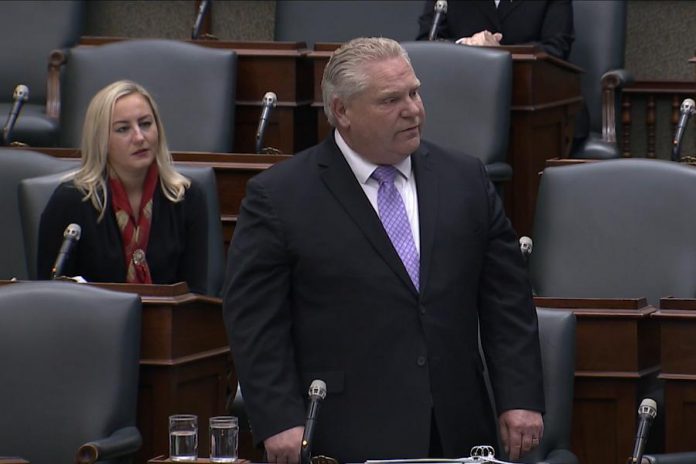
As expected, the Ontario government is extending the province’s state of emergency for an additional 28 days until Tuesday, May 12th.
The extension under the Emergency Management and Civil Protection Act (EMCPA) was approved on Tuesday (April 14) during a special sitting of the Ontario legislature, on the advice of Ontario’s chief medical officer of health and with the full cooperation of all the parties.
“During these unprecedented times, we cannot let our guard down,” Premier Doug Ford said. “The actions being taken by everyone to stay home and practice physical distancing are making a difference, but we are not out of the woods yet. With the support of every Ontario MPP, we continue to take any and all actions necessary to support our front-line health care workers and respond rapidly and decisively to slow the spread of this deadly virus.”
VIDEO: Premier Doug Ford addresses the Ontario legislature – April 14, 2020
The provincial government first declared a 14-day state of emergency on Tuesday, March 17th. Under the provisions of the ECMPA, the state of emergency could be extended for one additional 14-day period (until April 14th) with further 28-day period extensions requiring the support of the legislature.
The extension of the provincial declaration of emergency allows Ontario to continue to enforce current emergency orders, such as the closure of all non-essential workplaces, outdoor amenities such as parks and recreational areas, public places and bars and restaurants, as well as restrictions on social gatherings of more than five people, and prohibitions against price gouging.
The legislature also passed the Coronavirus (COVID-19) Support and Protection Act to amend the Education Act, Planning Act, Development Charges Act, Police Services Act and the Ministry of Training, Colleges and Universities Act.
The amendments to the Education Act will allow school boards to continue charging fees on new construction to retain a source of revenue for new school projects. The bill also includes an amendment to provide consistent province-wide approach to addressing school suspensions and expulsions for the safety of students and staff upon the reopening of schools.
The changes to the Ministry of Training, Colleges and Universities Act will temporarily suspend student loan payments for OSAP borrowers and initiate a six-month interest-free moratorium on OSAP loans.
The government is making it possible to suspend certain municipal planning decision timelines during the state of emergency, changing the Development Charges Act to ensure municipalities can continue to count on a source of revenue that helps pay for local growth-related infrastructure, such as roads, water and sewers, as well as fire and police services.
The amendments to the Police Services Act also allow the Solicitor General to give municipalities an extension beyond January 1, 2021 to prepare and adopt a community safety and well-being plan.



























